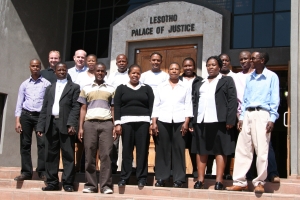VoxPopuLII
[Ed. – Kerry Anderson has graciously served as our guinea-pig for this first episode of VoxPopuLII, and we thank her for her patience as we’ve debugged our process. Full information about VoxPop can be found here, and in the series announcement here]
At its most basic level, a legal information institute obtains primary legal information from the public bodies responsible for producing that information, and makes it available online for free, full and anonymous access.
But what is a legal information institute when the courts from which judgments must be acquired are not themselves always sure where the final copy of the judgment is – either in electronic or in hard copy format?
What is a legal information institute when the courts from which judgments are sourced do not take the responsibility for ensuring that private information, including the names of minors and victims in sexual abuse cases, are removed from the judgments?
What is a legal information institute when the legislation of a country is available only through the purchase of costly subscriptions from a commercial publisher contracted by the Parliament of that country?
What is a legal information institute when the last Law Reports available in a country date from more than 20 years previously? Or not at all?
What is a Legal Information Institute when the transcripts of judgments are refused for publication – even by the courts themselves – by the company contracted to provide the transcription service on some very shady grounds of copyright?
All of the above describe situations SAFLII (the Southern African Legal Information Institute) has encountered in its dealings with jurisdictions across Southern and Eastern Africa. We have found ourselves assuming a responsibility for public access to legal information in a way that often places us in a quagmire of jurisprudence and legislative complexity that is at odds with the more traditional interpretation of a legal information institute. In one jurisdiction a minor is someone under 21, in another, under 18. What constitutes private information differs from one jurisdiction to another. Tax legislation requiring privacy is applied to companies in different ways according to the jurisdiction. Courts in Southern and Eastern Africa are notoriously under-funded: they lack computers, resources, and skills for tracking all of this information. Were SAFLII to rely on these courts to amend materials found to be problematic, our cupboard would be bare indeed.
Even more concerning is the role we have found ourselves assuming of the primary – and only – publisher of legal materials for some countries. Zimbabwe has not been able to publish its Law Reports since 2003 owing to the devastating collapse of infrastructure resulting from the political situation. Swaziland last published Law Reports in the 1980s. Many other countries have out-of-date Law Reports with no resources to continue the Law Reporting function. Others have written more eloquently than I on the necessity of having contextual law, particularly in common law jurisdictions. The point is singular and self-evident: how can the laws of a country be known if the laws of the country are not available?
In finding inventive and creative strategies for dealing with these situations, we have traveled quite far down the rabbit hole. We have conducted scanning projects in some courts to digitize a bulk of material that would otherwise not be available (unless you happen to be visiting Bloemfontein, Maseru or Kampala). We regularly undertake audits of the material on our website and anonymize material in accordance with our published policy – this policy having been developed with the assistance of judges and legal practitioners from the region. We have integrated our workflows with those of some of the courts in our jurisdictions. We have supported, and continue to support, the development of legal reporting structures – sometimes with the public bodies responsible – in countries where these are not available. We are looking at employing students to visit courts on a weekly basis to assist with locating and digitizing judgments handed down that week. We are engaging with lawyers in private practice to source legislation from some jurisdictions.
Of significance is the fact that we have never encountered resistance to the concept of Free Access to Law. The issues I have described relate to shortages of resources, skills and technical infrastructure – but not aspiration. Which is why it is critical that the strategies we employ do not undermine the self-sufficiency of nascent law reporting structures. It is perhaps in the subtleties of how assistance and support is offered that we can find ways to engage that are not overbearing. It takes just one person of vision and determination – a change agent – within a court, a university, a private practice, an NGO or a law reporting committee to unblock the system sufficiently that a legal information institute – whatever your definition – can develop. We therefore see our most important task as being to identify these change agents and to transfer our accumulated knowledge as well as that which we ourselves have been given by other legal information institutes. The transfer of knowledge has taken the form of training, internship and exchange programmes which we aim to grow further.
We have evolved our strategies according to the context in which we operate. Not all of them fit within the conventional LII approach. Some have been found to be questionable. But sometimes, further down the rabbit hole is the only place to go.
 Kerry Anderson is the Deputy Director and Head of IT for the Southern African Legal Information Institute (SAFLII). She has worked variously in web development, research and strategy for an advertising agency, IT startups and financial services corporates. She has been known to be a badge-wearing supporter of the Free Software Foundation and is an old-school Perl hacker. She has since applied her skills to the furthering of the aims of Free Access to Law – delighted to have found the perfect synthesis of Law and Code.
Kerry Anderson is the Deputy Director and Head of IT for the Southern African Legal Information Institute (SAFLII). She has worked variously in web development, research and strategy for an advertising agency, IT startups and financial services corporates. She has been known to be a badge-wearing supporter of the Free Software Foundation and is an old-school Perl hacker. She has since applied her skills to the furthering of the aims of Free Access to Law – delighted to have found the perfect synthesis of Law and Code.
She has a BSc in Computer Science, a BComm (Conversion) and an MBA. Her MBA dissertation was on the impact of Open Innovation on software research development clusters in South Africa.
VoxPopuLII is edited by Judith Pratt.





Excellent post, Ms Anderson.
One of the problem with publishing Law Reports online is the “persistence of information” on the web – once something gets onto the Internet it never, ever goes away and will remain accessible, searchable and visible forever. This presents a great challenge when you need to revoke something that was published online. For e.g. if a court document, containing names of minors and victims in sexual abuse case, was published online by mistake, there is no easy way to remove all traces of that information at a later date.
Have you run into similar situations? If so, how have you handled them?
The persistence of information in the context of ensuring appropriate levels of privacy can be problematic. We have run into very similar situations to that you describe. Our solution has, necessarily, been technical:
1. We add a no-cache option to the html version of the judgment.
2. We exclude .pdf and .rtf files from indexing by search engines since these cannot be metatagged.
3. We use the webmaster tools provided by search engines to request the removal of specific pages from their search results.
So, when a situation has arisen where a judgment has not been anonymized or must be removed altogether, we immediately effect the change on our site. We then notify the search engines (so far, only Google and Yahoo) to request that the link be removed from their website. Then the next time the search engine indexes our site, only the latest version of the collections are indexed.
Really nice post! No doubt publication is critical, and you are doing important work. But I would argue that while publication is a necessary condition of legal reform — it is not sufficient to build accountability. For that, one also needs systems to assess the legal product for its adherence to standards on an ongoing basis. Some years ago, we tried to build such an assessment system here in Estonia (at least for Supreme Court judgments), and it has had some interesting effects. At the same time, it was quite a learning experience to try to get beyond “legal digesting” to “assessing”. Moreover, questions persist about who should manage such a system and how it should be financed. As director of the judicial training center, I argued that the system should be autonomous from the courts and ministries — to insure that it does not get coopted. Sad to say, my argument did not prevail, and now the ministry of justice runs it. But I am curious whether this adventure resonates with others who have been trying to build such capacity around the world.
[…] countries’ LIIs, as aptly pointed by my colleague Kerry Anderson in a post below, often involves getting information from […]
[…] of legal information so that citizens have access to their own laws. As Kerry Anderson has noted In a VOXPOULII blog post, Free Access to Law matters the most to the poorest and most unstable […]
[…] first post in the series, What is a Legal Information Institute?, comes from Kerry Anderson, deputy director and head of IT for the Southern African Legal […]